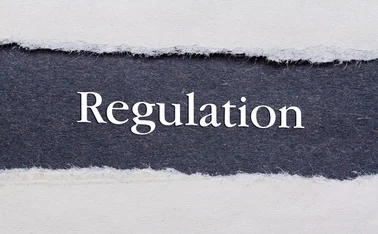
Hiscox QC accuses FCA of 'tearing up the rule book on causation'

Jonathan Gaisman, QC, branded parts of the Financial Conduct Authority’s arguments as camouflage, a misuse of language and “blurring every divisible thing into one amorphous mass” as he defended Hiscox in the ongoing business interruption test court case.
Gaisman began his online presentation to Mr Justice Butcher and Lord Justice Flaux on day five of the case by tackling the provider’s non-damage denial of access and public authority clauses.
Starting with the public authority clause he cited the four factors that needed to be present as set out in the defendants’ joint skeleton argument on causation.
This covered the sequence where the insured must prove loss has been caused by an interruption, caused by inability to use the insured premises, due to restrictions imposed following an occurrence of a disease.
He argued the situation needed to be approached without hindsight.
“We need to be aware that when the FCA invokes what the parties must have meant, the intention or at least the effect of that phrase is often to camouflage those points in its argument where there is nothing but their assertion,” he commented.
If Hiscox can prove neither clause applies to present facts then there is no cover in place he continued and argued that even if it falls short the more points it is proved right on the more “confined” the indemnity is likely to be.
“It is a remarkable feature of the FCA’s submission on causation that unless Hiscox has a complete win on coverage it may as well not bother making submissions on many aspects of coverage because on the FCA case’s even if Hiscox is right on many of those submissions it won’t do it any good,” he observed.
Burden
In his view the FCA is arguing that only its approach does not put an intolerable burden on the insured in proving its loss.
However, he pinpointed there was still room for loss adjusting.
“The big leap in the FCA’s case is to ascribe to the parties a unique, legally startling and unequivocal prospective intention to abdicate any attempt to work out what loss was caused by the insured peril and what loss would have occurred anyway,” he said.
He categorised the argument as assuming the quantification of loss would be so difficult that “the normal rules governing a measure of indemnity should be discarded” and counter-argued there was no evidence anywhere for this radical assertion.
Insurers would only be responsible for loss caused by public authority action, not all effects, he said.
“The debate as presented by the FCA is between extreme alternatives,” he summed up and refuted the idea that Hiscox was “cherry picking”.
“It doesn’t matter how often it is said by the FCA, this is not true.”
There is, he repeated, no magical difference between BI with complex covers and any other insurance as he accused the FCA of “tearing up the rule book on causation”.
“Your lordships are being invited to voyage to a very strange place indeed,” he warned.
Gaisman said he recognised the burden the FCA was under in trying to pull together wordings from individual policies across the market and submit them but stressed he was there to put the case for Hiscox’s and nobody else’s.
He asked: “What sort of a thing is an incident or an occurrence?”
Gaisman noted that in its Particular of Claims the FCA had used “incident” in one section and then “occurrence” just a few paragraphs later as it could not make up its mind.
He stated the FCA was trying to be granular for individual cases and to have a soaring bird’s eye view of the national emergency.
When it suited the regulator it would look through the other end of the telescope, he said, as it had a perennial problem of defining the terms.
The pandemic is not the aggregation of any number of cases on any date, he detailed, saying it was more than that with fears about future cases and the NHS being overwhelmed leading to government actions.
Again questioning if the emergency was one incident he said the FCA was trying to cram something “too big” into its definition of an occurrence.
Cessation
And he criticised the wording in the watchdog’s skeleton argument where “specific to every insured” was a misuse of language as “specific to all cannot be described as specific”.
Gaisman also addressed the meaning of interruption.
On the second day of proceedings Colin Edelman, counsel for the regulator, had described Hiscox’s submission as “outlandish” noting it was declining claims that did not involve a complete cessation of business.
Gaisman told the judges that it had not been able to find “anywhere that construes interruption as anything other than cessation”.
He also took issue with Edelman stating on day one that insurance would cover the reaction of the public and questioned if there is indemnity for all the consequences of the disease or the narrower effects.
When restrictions are imposed they must be mandatory and not guidance he stated as he looked at the timeline of how the emergency developed in the UK.
He said periods when the government was asking or advising or saying ‘should do’ were not the same but that the FCA was “blurring every divisible thing into one amorphous mass”.
Social distancing and the effects of people voluntarily staying away from businesses falls outside of the clauses, he said.
He also took aim at the argument for indemnity under the NDDA clause saying it was so feeble “that even the Hiscox Action Group interveners are not bothering to advance it”.
Gaisman addressed the topic of vicinity where Hiscox has had a one-mile radius.
“It has to be the sort of incident the parties at time of contracting would have contemplated [could] lead to denial of access,” such as a burst water main, traffic incident or a crime, he listed.
Pandemic could “hardly be further away” from what the parties would have in mind, he said, arguing it was too geographically disbursed and non-specific to qualify as an incident anyway.
Figure of speech
Just saying the pandemic was “everywhere in the UK” is merely a figure of speech he continued which “operates on a quite different plane of meaning from the requirements stipulated by the clause”.
The radius was further proof of only local events being covered, otherwise why else put it in, he asked.
“Clearly the pandemic is in no sense local.”
Gaisman also challenged where use of premises was not rendered legally impossible.
Under the NDDA Hiscox’s primary case is there was no denial or hindrance of access except those required to close by legislation after 26 March.
He described that in its skeleton argument the FCA had caricaturised Hiscox’s position and invited the court to understand the terms. Reducing the argument to the one-mile circle was an over simplification.
Gaisman accepted there were a series of “pointers” in his submission rather than a “knockout blow” as he looked for clues as to what the parties meant.
For instance, on cyber attacks Hiscox excluded global scale computer viruses – which he said were the nearest thing that can be compared to a pandemic – and only paid out for direct attacks on the insured.
This was an “additional pointer that Hiscox wanted nothing to do with risks of this breadth”.
People could look at many other special covers and the picture that emerged was of wide cover being circumscribed.
“The FCA’s case is apparently this, that in the case of an occurrence of disease alone, the Hiscox underwriters are to be treated as having thrown cautioned to the winds and assumed an unfettered liability for the consequences of any notifiable disease anywhere with no proximity, locality connection with the insured or its business other than the fact of its inability to use. And all as an adjunct to an adjunct of property cover.”
Instead he submitted this was not only highly improbable but obvious that Hiscox had done no such thing as he responded to the FCA describing its “occurrence” argument as being “desperate”.
Means what it says
Moving on to the questions of inability to use he stated that “the expression ‘your inability to use the insured premises’ means what it says”.
He saw that the FCA said any impairment of normal use constitutes inability to use and noted there was a big gap between the parties.
“It is the assured’s use only that is relevant,” he insisted. “It is not the customers’ use and purpose that is relevant.”
And he added it was a binary question of whether the insured was able to use the premises or not.
He refuted Edelman’s argument on day two that Hiscox was deploying an “absolutist” approach and was only applying policies where “every single square inch” of a premise could not be used.
“We don’t accept our construction is at all uncommercial,” he said noting that some clients, such as for example a tailor, could still work out of buildings even if customers could not attend. They were able to work on products and supply orders online.
Developing the point on customers attending he noted that the restrictions imposed on 26 March were directed at people’s movements and pre-Covid “the very idea that a public authority could impose a form of modified house arrest on the entire population would have been thought the stuff of nightmares”.
“The FCA’s argument makes illegitimate use of hindsight,” he said.
And he accused the FCA of trying to broaden the Hiscox cover to include interference rather than pure interruption.
“Nothing less than interruption will do,” he insisted.
Whereas the FCA wanted too broad a case of “some operational impact” and that a business was interrupted if it was not able to carry out its operations in the manner it normally has, Hiscox has argued that interruption requires more than “some sort of change”.
Edelman, Gaisman recounted, had referred to interference as “marginally” wider than interruption but the FCA had not explained how it was marginally wider.
Gaisman developed the argument that a business that can carry on in part is in principle not interrupted as it has not ceased.
Using the example of category five businesses, such as accountants and lawyers – “people who found it easiest to work from home” – Gaisman said the full panoply of modern communication tools were available and in principle they were not interrupted.
He calculated that 65% of Hiscox’s businesses in this sense were permitted to remain open and active but nevertheless many had tried to make claims.
“For many insureds in category five life carried on maybe not as normal,” he said.
The fact the court case was being held “as smoothly as we are” is evidence that none of our businesses have been interrupted, Gaisman pointed on.
Economic activity
Finally, as the session drew to a close, he questioned how it could be proved which losses came solely and directly from an interruption, particularly for those work-from-home business that were able to get up and running in less than a week.
If a specific activity was lost that would count, Gaisman admitted, but economic activity being down would not.
He concluded that the FCA had a “jackpot argument” as it looked to get its fruits in a row in the machine.
Gaisman will continue to present to the judges behalf of Hiscox today as one of eight defendants in the test case. The others are RSA, MS Amlin, Ecclesiastical, Arch Insurance, Zurich, QBE and Argenta.
Only users who have a paid subscription or are part of a corporate subscription are able to print or copy content.
To access these options, along with all other subscription benefits, please contact info@postonline.co.uk or view our subscription options here: http://subscriptions.postonline.co.uk/subscribe
You are currently unable to print this content. Please contact info@postonline.co.uk to find out more.
You are currently unable to copy this content. Please contact info@postonline.co.uk to find out more.
Copyright Infopro Digital Limited. All rights reserved.
As outlined in our terms and conditions, https://www.infopro-digital.com/terms-and-conditions/subscriptions/ (point 2.4), printing is limited to a single copy.
If you would like to purchase additional rights please email info@postonline.co.uk
Copyright Infopro Digital Limited. All rights reserved.
You may share this content using our article tools. As outlined in our terms and conditions, https://www.infopro-digital.com/terms-and-conditions/subscriptions/ (clause 2.4), an Authorised User may only make one copy of the materials for their own personal use. You must also comply with the restrictions in clause 2.5.
If you would like to purchase additional rights please email info@postonline.co.uk








